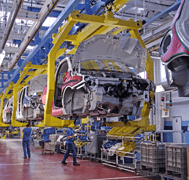 The automotive supply chain is one of the most complex supply chains in the world.
The automotive supply chain is one of the most complex supply chains in the world.
Thanks to digitalization and globalization, the automotive supply chain has become a multi-national relationship between many suppliers and builders.
Nowadays, a car’s parts come from several different countries, are assembled in different countries, get shipped to different countries, and are sold in different countries.
But it’s not just more digitalization and globalization.
Changes in the manufacturing process, consumer demands, how people want to experience services and products, and disruptive trends in the manufacturing landscape have all impacted the automotive supply chain.
Because of this complex process that moves raw materials to dealerships to the hands of consumers around the world, the automotive supply chain faces many unique challenges.
These are only a few of the examples:
- Poor Visibility of Automotive Parts – 81% of the automotive industry is concerned about visibility in the supply chain. Because a car’s many parts are either manufactured in-house or sourced from a third-party manufacturer, a lack of visibility can cause significant delays, inventory shortages, and revenue loss.
- Impact of External Factors –Environmental disruptions, import and export deals, and a global health crisis are just a few of the factors. This can affect a manufacturing plant’s ability to operate, source raw materials, and deliver inventory on time.
- Changing Consumer Preferences – Consumer trends and preferences determine the demand for vehicles. When consumers change what they want or how they want to receive their products, the automotive supply chain needs to make significant shifts to accommodate.
- Lack of Visibility for Costs – Automotive manufacturers have high fixed and variable costs that include machinery, staffing, R&D, suppliers, materials, and shipping. Without high visibility of expenses, it will be hard to determine accurate price points and profit margins.
- Poor Quality Assessments – Proper quality inspections ensure that vehicles meet production guidelines and are in excellent condition when they reach the hands of consumers. Lack of auditing can lead to failures and recalls which damage reputation and profit loss.
How Can These Challenges Be Overcome?
With ERP software, automotive supply chain managers get real-time tracking and monitoring of inventory items, increased visibility of supply chain networks and costs, and better control of the supply chain every step of the way.
It automates the tracking process throughout the vehicle lifecycle which reduces delays, allows managers to better plan for anticipated disruptions, and provides a better experience for customers.
At SHEA Global, we’re dedicated to helping you choose the right ERP solution for your automotive supply chain. We’ll evaluate your business to determine the best option that meets your manufacturing needs, so you can gain better responsiveness and competitiveness of your supply chain.
Contact us to learn more about how we can help.